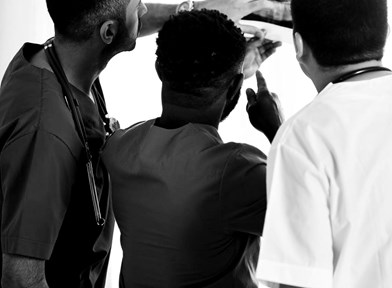
Prior to the coronavirus pandemic I was a trust grade junior registrar, using this year at a district general hospital to gain experience, skills and portfolio points for round two of National Selection. My urology registrar on-call duties would consist of one 12-hour shift a week and one weekend in four. The day would start with a morning ward round with the consultant and junior doctor. The junior would complete jobs generated by the ward round.
The registrar would see all new admissions from A&E and GP, ward referrals and cover emergency theatre as well as provide the ward doctor with support and advice when needed. Overnight urology would be covered by a senior house officer with a consultant on call from home. This all changed after the UK went into lockdown on 23 March 2020 in response to the coronavirus pandemic.
Changes to working structures
I became part of the Junior Doctors Council when our hospital was planning their response to the pandemic. The Junior Doctors Council worked with the British Medical Association (BMA) to voice the concerns of junior doctors. We held junior doctor forums and used surveys to enable as many doctors as possible to have their say. This was particularly important when core trainees or foundation level doctors were redeployed. Their rota changed such that they were working six eight-hour shifts followed by two days off. Initially, there were concerns about getting to and from work with these new shift times. Our trust responded by offering either free accommodation or reimbursing taxi fees.
Furthermore, the doctor’s mess invested in extra refrigerators and the trust provided free ready meals to make the situation easier for us. The trust sends out daily email updates informing staff of any changes to policy, and any training or personal protective equipment (PPE) fit testing sessions being held. These training sessions include IT training and clinic skills such as cannulation, venepuncture and arterial blood gases aimed at senior doctors in specialties where juniors had been redeployed into other specialties.
Redeployment meant that our department lost F1 ward cover and senior house officer night cover. As a result of this the registrar would undertake ward tasks such as writing drug charts, cannulating and bleeding patients in addition to on-call duties. Fortunately, for most of us it was not too long ago that this was part of our routine work and for those who were more senior it seemed to come back like riding a bike. We also had to create a new rota for the urology registrars to cover the overnight gap and provide 24-hour cover at a registrar level. Prior to this I had never done 24 hour on-calls or designed a rota. I got to see first-hand the challenges of trying to make the rota compliant with the European Working Time Directive and the BMA. We managed to find a workable rota which would enable us to cover one another if someone became unwell. Indeed, one of our registrars did have to self-isolate for two weeks and our new rota enabled us to provide adequate cover.
Unfortunately, our new rota meant that the urology registrars were no longer timetabled for elective work which reduced learning opportunities. Two of the four registrars were classed by our occupational health department as ‘amber risk’. This means that that they have been advised to avoid involvement in aerosol generating procedures or visiting high-risk areas such as the intensive therapy unit (ITU), theatre or any ‘red’ areas of the hospital. These areas are the wards on which patients who have tested positive for COVID-19 are being cared for. Further training opportunities are lost by those at amber risk as they are unable to perform emergency theatre procedures.

Impact on emergency urology
Initially, A&E referrals were few and far between, sometimes none in a 24-hour period. This made the loss of juniors easier whilst we settled into our new routine. It was strange that we were not seeing the usual emergency admissions like acute urinary retentions, particularly as this is not something that a patient could delay seeking medical attention for. Patients seemed to heed the social media message of “We stayed at work for you. You stay at home for us.” The concern was that people that needed urgent medical attention would not present for fear of catching COVID-19. Fortunately, the message has been adjusted to make patients aware that the NHS is able to safely provide care for people that need it and this message is starting to be heard as more and more patients are now coming through A&E. Similarly, GP referrals to hospital have also reduced.
Prior to COVID-19 we would see a lot of patients with testicular pain from the GP for a review. However, more recently I have had discussions with GPs whose patients are terrified to go and see their GP let alone come into hospital for review. Such discussions have involved elderly patients with a few days’ history of pain where the diagnosis is almost certainly epididymo-orchitis and the GP can commence antibiotics with safe-guarding advice to come to hospital if they become more unwell. When patients refuse admission to hospital in potentially more serious presentations it is a difficult situation, but one that happens even in the absence of a pandemic. Despite the reason for refusing admission the Mental Capacity Act 2005 is still applicable. As long as the patient has capacity in that they have been given all of the relevant information, and can retain, weigh up the risks and benefits and communicate their decisions, then they are allowed to make “unwise decisions”.
Changes to elective practice and communication
In addition, COVID-19 has brought about several changes in our elective practice. Our urology department adapted quickly by cancelling all face to face clinics in the first instance and replacing them with telephone clinics. Prior to the coronavirus we had been undertaking some virtual clinics for prostate specific antigen (PSA) monitoring and follow-up post nephrectomy and nephroureterectomy. Therefore, we had systems already in place which were compatible with the new demands the pandemic placed on our elective work. Initially, urgent and cancer-based clinics were prioritised for the telephone consultants including multidisciplinary team (MDT) outcome discussions which would previously have been face to face consultations. These were followed up with a phone call later that day from a urology cancer nurse specialist. I sat in to observe some of these consultations and was surprised how well these discussions went.
We are now undertaking telephone consultation for all outpatients including routine referrals. It would be interesting to see the patient’s perspective on these discussions. It may be at as the current situation resolves we could give patients the option for telephone consultants in place of face to face. I think a positive change that could come out of the pandemic is that we can reflect on how we deal with outpatients and follow-ups. Virtual clinics have the benefit of not requiring clinic staff, while patients don’t have to worry about transport and parking. Alternatively, it can make assessment of a patient’s fitness for theatre difficult without seeing them in person and being able to physically examine them. So, this would obviously not be suitable for all patients. Furthermore, telephone consultations can be challenging, particularly if your patient is hard of hearing or the phone line is bad. Some of our patients pointed out, that whilst we verify their identity by checking their personal details, they have no way of verifying our identity as our calls come from a withheld number. We therefore implemented a password system to help reassure patients that they were indeed talking to the doctor.
We are still able to request investigations as a result of these consultations. Imaging is triaged, based on urgency. Urgent imaging is undertaken as planned but more routine imaging is postponed. Similarly, we are still doing two-week wait flexible cystoscopies and check cystoscopies for high grade bladder cancers. Low grade bladder cancer cystoscopies are still occurring but are being postponed. We have also managed to maintain a lithotripsy service for our stone patients. Urgent theatre cases, such as stones that have stents in situ and cancer cases, are also still being undertaken. We have had to adapt how we communicate with one another. Programmes such as Microsoft Teams and StarLeaf are now used for communication between staff in order to continue MDT discussions and weekly meetings with management whilst maintaining social distancing.
Impact on training
The pandemic has not only had an impact on my clinical practice, but it has also had an impact on my application to Urology National Selection. Last year I was unsuccessful with my feedback scores highlighting a poor portfolio score as an area requiring improvement. I spent the following year gaining extra portfolio points and by the time of application I believed I had an average scoring portfolio which I was hoping would be enhanced by a similar if not better interview performance in view of my year of extra experience working at the level of a registrar. However, 10 days prior to my interview, I was informed that these had been cancelled. Initially, there was hope that the interview may take place in some sort of Skype format but unfortunately Health Education England decided to assess candidates purely on their self-assessment portfolio scores. I again was appointable but not appointed. Whilst frustrating, I can see the value of the extra experience I am gaining through my role as a trust grade registrar. Equally frustrating is the effect that coronavirus is having on my ability to improve my portfolio score. I have continued to work on my portfolio and submitted abstracts to conferences.
I have been lucky to have been accepted for two oral presentations but unlucky in that these conferences have been cancelled as a result of coronavirus. They will therefore not count as ‘delivered’ oral presentations as specified in this year’s portfolio mark scheme. However, I wonder if 2021’s portfolio scheme will take into account these exceptional circumstances. Regardless I will keep striving for those extra portfolio points and hope that I am not only appointable, but one day I will be appointed.





